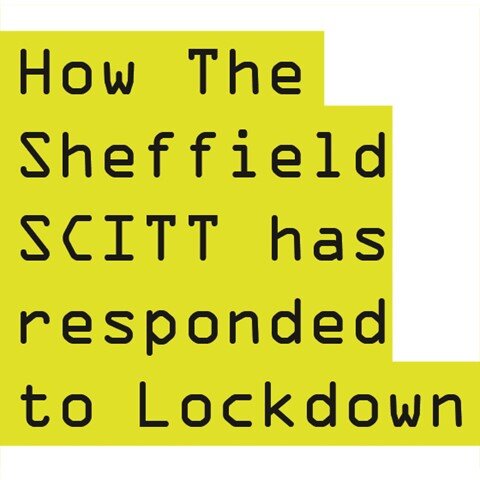Our response to the National Lockdown
"Like so many people and organisations, our best laid plans were turned upside down when the national lockdown was announced in March. In our case we had a cohort of 80 trainee teachers who could suddenly no longer go into schools to train".
John Coats. Director at The Sheffield SCITT
A series of meetings took place, all using something called Zoom, and in fairly short order we had the bones of a plan. Shortly after, and within 10 days of lockdown, we had an alternative Sheffield SCITT ‘remote’ curriculum in place for our trainees that we are actually really quite proud of.
“While I am hugely proud of the quality of provision that we have managed to put in place in a really very short timescale, I am also equally proud of the way that the entire Sheffield Partnership (trainees, mentors, course leads and schools) have responded to this situation. Our trainees have shown such huge resilience and flexibility (two essential characteristics for a teacher!) in dealing with the uncertainties during this time. The Sheffield SCITT staff, and I really do mean everyone here, have quite simply been amazing and I couldn’t have had a better team to navigate through this period.”
All trainees have been supported by their mentors to construct individual action plans to work through during the period of lockdown. This looks different for each trainee, but the common ingredient is a focus on those areas identified by the mentor and trainee as areas for development – you don’t have to be in front of a classroom full of students to think about particular aspects of your practice.
All of our training sessions have been turned into online/remote sessions. This has been a real positive for us as we have seen the potential for the use of remote communication to deliver mentor training next year and to support workload for everyone by reducing unnecessary travel time.
We have set up and are running a reflective journal club, taking place every week. Reading materials go out on the Friday, our Research Lead (we are lucky to be an Associate Research School and to have access to ‘Alastair’) delivers a webinar to trainees on the Monday, trainees are given a series of reflective questions to respond to and to discuss with their mentor during the week, and there is a facilitated webinar on the Friday in small groups to pull the trainees’ learning together. Zoom seems to handle the 80+ trainees and SCITT staff who log-on on a Monday to Alastair’s introductory sessions.
We have re-written expectations around the final evidence bundles that we ask trainees to produce – these will be based on the work undertaken during lockdown. Doing the final evidence bundle reviews is always a highlight of my year – its so rewarding to hear our trainees talk so confidently about their impact on student outcomes. This year will be a little different – I’m not sure if I’m virtually discussing, or discussing virtually(!) – but I am looking forward to hearing about the impact of our alternative programme on our trainees’ practice.
The guidance from the government relaxing the requirements for the award of QTS this year has been absolutely the right and fair thing to do. We have always been very clear that there is a huge gap between doing enough to satisfy the relaxed criteria for the award of QTS and doing whatever we can to ensure that our trainees are in the best possible position to start their NQT year in 3 months’ time. I genuinely feel that we are accomplishing the latter.







